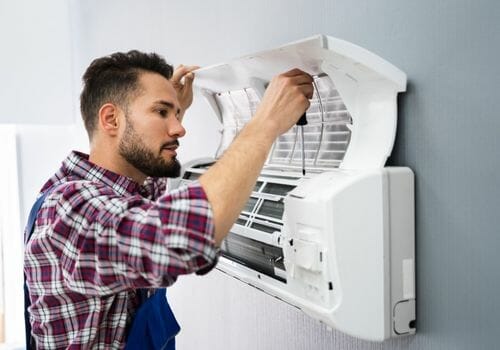Eco-Friendly Alternative to Air Conditioning: Top 11
Looking for a way to keep your home cool during the summer months without using air conditioning? Check out these seven eco-friendly alternative solutions!
Summertime means hot weather, and for many people, that means turning on the air conditioner. But what if there was an eco-friendly alternative to air conditioning? Believe it or not, there is! Fans are a great way to cool down a room without using any electricity. Plus, they’re affordable and easy to use.
Negative Impacts of Air Conditioning Use
In the summertime, when the weather is hot and sticky, many people rely on air conditioning technology to keep them cool. While air conditioning can certainly make life more comfortable, it also has a number of negative impacts.
- Producing and running air conditioners requires large amounts of energy, which leads to increased carbon emissions and higher utility bills.
- ACs also contribute to global warming by releasing greenhouse gases into the atmosphere.
- In addition to harming the environment, air conditioning can be bad for our health. It can increase the risk of respiratory problems and put extra strain on our hearts.
- Finally, air conditioning is often cited as a major contributor to climate change, which could have devastating consequences for our planet in the future.

The Hidden Energy Costs Behind Air Conditioning
Few people realize that air conditioning comes with a hidden cost: energy consumption. Air conditioning can account for up to 50% of a building’s energy use, and in the summer months, it can be the single biggest drain on your energy budget.
There are a number of ways to reduce your air conditioning costs. One is to install a programmable thermostat, which can help you save money by automatically adjusting the temperature when you’re not home. Another is to make sure your windows and doors are properly sealed and insulated so that less cool air escapes your home.
Get Your Hand on Your Eco-Friendly Living Starter Guide!
If you are looking to save money and care for the environment, then you will want to know about eco-friendly alternatives to ACs.
AC Alternatives for the Environmentally Friendly
Air conditioners use an incredible amount of energy, and that energy is often generated by burning fossil fuels, which release harmful greenhouse gases into the atmosphere. There are several alternatives to air conditioning that can help you stay cool while being more environmentally friendly.
Let’s explore 12 air conditioner alternatives for the environmentally friendly.
#1 Use awnings
Awnings are a great way to keep the sun and weather off of you while you are enjoying the outdoors. They come in a variety of colours and styles to match any home. Awnings can be attached to the side of your house or porch, or they can be free-standing. They are also a great way to shade your deck or patio furniture from the sun.
#2 Paint the ceiling to cool down your room
Summertime is a time for fun in the sun, but it can also be a time when your home feels like an oven. One way to cool down your home is to paint the ceiling white. According to Penn State’s College of Earth and Mineral Science, “light-coloured surfaces effectively reflect most of the heat away from a home.”
#3 Whole House Fans
A whole house fan is a large fan that pulls air in through open windows and pushes it out through the roof. This causes the home to cool down quickly. In the winter, the fan can be reversed to push warm air into the home from outside.
Whole house fans are available in a variety of sizes. They can be installed in minutes by a handy homeowner and do not require any special wiring or ductwork.
Whole house fans are a great way to cool your home without spending a lot of money on electricity.

#4 Plant a tree or overhanging plant
Planting a tree can help reduce your room’s and house’s temperature. An overhanging tree can cover an entire room with its shade, keeping the heat out. The warmth of the sun will not be able to penetrate into your home and make it hotter. Plus, the plant will help provide oxygen to the room and keep it fresh. You can also plant a tree in your yard to cool off the air around you.
#5 Geothermal Cooling Systems
Geothermal cooling takes advantage of the natural underground heat to cool buildings. This method is much cleaner and more efficient than traditional air conditioning, and it also helps to conserve energy.
Geothermal cooling works by using the earth’s heat to create a liquid which is pumped through an underground system. The liquid circulates through pipes and vents, where it cools down the building completely. Many new homes are being built with geothermal cooling since it can be more effective than air conditioning.
#6 Radiant Cooling
Radiant cooling is a type of passive cooling that uses radiant energy, such as sunlight or moonlight to cool a building. The sun’s energy is absorbed by the building’s facade and then released slowly at night, leading to a cooler interior. This type of cooling is especially effective in hot climates where air conditioning is not always necessary.
#7 Use Ice to stay cool
One of the best ways to stay cool during the summer months is by using ice. When temperatures soar, most people seek refuge in air-conditioned buildings, but there are other ways to keep cool. One way is to use ice. Here are some tips on how to use ice:
- Fill a container with ice and place it in front of a fan. The fan will blow the cold air from the ice across your body, providing relief from the heat.
- Put an ice pack on your head or neck. This will help cool your whole body down.
- Drink cold liquids such as iced tea or cold water. This will help keep you cool from the inside out.
- Take a cold shower or bath. This is a great way to refresh yourself and lower your body temperature.
#8 Ice-powered Air Conditioners
Ice-powered air conditioners work by using ice to cool the air before it enters your home. This can be a great way to save money on your cooling bill, as well as help the environment by reducing your carbon footprint.
#9 Use Hydronic Cooling
The use of Hydronic cooling is becoming a popular choice for cooling systems in the summer. Hydronic cooling works by using water to absorb heat from the air and then releasing that heat into the ground. This process can be repeated to keep your home cool and comfortable all summer long.
One of the benefits of hydronic cooling is that it can be used to cool more than just your home. It can also be used to cool businesses, churches, schools, and other large buildings. In addition, hydronic cooling is more energy efficient than traditional air conditioning systems, so you can save money on your energy bills.
#10 Hybrid Solar Air Conditioners
Most air conditioners use electricity to power a compressor that compresses refrigerant gas and forces it through a condenser coil. The cooled gas then flows into the evaporator coil in the indoor unit, where it absorbs heat from the air, cooling it.
A hybrid solar air conditioner uses both solar power and electricity. In sunny weather, the air conditioner operates on solar power alone. If there is not enough sunlight, the unit switches over to electrical power.
The hybrid system uses a smaller compressor, so it can be installed in places where there is not enough solar power for an air conditioner. By using a smaller compressor and fewer components, the price of hybrid solar air conditioners is less than that of traditional air conditioners.
#11 Use Ceiling Fans
Ceiling fans use less energy than air conditioning, and they’re also more efficient because they extract more heat from the room. You can also install a window fan or buy an outdoor air conditioner. These appliances work by circulating cold air around your home.
One thing people often forget when it comes to ceiling fans is to make sure to clean off the dust.

Read More: Silicone vs Plastic: Which Is Sustainable For The Environment?
What is the most eco-friendly heating and cooling system?
There are a few different ways to go eco-friendly with cooling your home. One way is to install a geothermal cooling system. This system uses the earth’s natural thermal energy to cool your home. Another option is to install a solar-powered cooling system. This system uses the sun’s energy to power a fan that circulates cool air throughout your home.
Tips for Reducing AC Energy Use
It’s no secret that reducing your energy consumption can save you money on your utility bills, and the same is true for air conditioning. In the summer months, AC can account for a significant portion of your electricity use. Here are some tips to help you reduce your AC energy use and save money this summer.
- Install a Programmable Thermostat
- Get Blackout Curtains
- Turn Off the Lights
- Unplug Devices
- Keep Vents Clear and Open
- Use Fans Instead of AC
- Lower the Temperature of Your Water Heater
- Use Electricity During Off-Peak Hours
- Fill Your Space with Greenery
- Keep Up with Regular AC Maintenance
FAQ
What Is The Difference Between Air Conditioning And A Fan?
Air conditioning and fans both have the ability to cool a room, but there are distinct differences between the two. Fans use less energy than air conditioners and are much cheaper to operate, making them a more energy-efficient option for cooling rooms. Fans also work better in climates with higher humidity levels, while air conditioners are better suited for drier climates.
Can a portable air conditioner be an efficient air conditioner alternative?
Yes, a portable air conditioner can indeed be a good alternative to air conditioning
units. It is efficient for cooling down single rooms and can be moved around based on your needs.
Is A Geothermal Heating And Cooling System A More Sustainable Air Cooling Option?
Absolutely! Geothermal systems are renowned for their efficiency and sustainability. They use the constant temperature of the earth, which can provide efficient cooling in the summer and heating in the winter.
Can A Window Air Conditioner Serve As A Valid Alternative To Central Air?
Definitely. In fact, window air conditioners are often more energy-efficient than a central air conditioning system. They are usually installed in a single room, reducing your energy usage by cooling only the area you are using.
What Are Some Of The Benefits Of Alternatives To Central Air?
Alternatives to central air often consume less energy, reducing your carbon footprint. They also typically offer flexibility, allowing you to cool specific areas instead of the entire home. Additionally, alternatives like evaporative coolers add humidity to the air, which can be beneficial in dry climates.
How Do I Choose The Best Air Conditioner Alternative For Me?
To choose the best alternative, consider your area’s climate, the size of your home, your budget, and your individual cooling needs. Some alternatives work better in dry climates, while others are more suitable for humid conditions. It’s always a good idea to consult with an HVAC professional to make the most informed decision.
Can An Air Filter Help Make An Air Cooling Alternative More Effective?
Yes, many air cooling options have filters that remove allergens and particulates from the air. Not only does this make the air cooler, but it also makes it healthier to breathe. Remember to regularly clean or change the air filters for optimal performance and efficiency.
Conclusion
In conclusion, using an eco-friendly alternative to air conditioning is a great way to reduce your carbon footprint and save money. There are many different options available, so there is sure to be one that fits your needs. If you’re looking for a way to stay cool this summer, consider using one of these alternatives to air conditioning.
Keep Reading:






